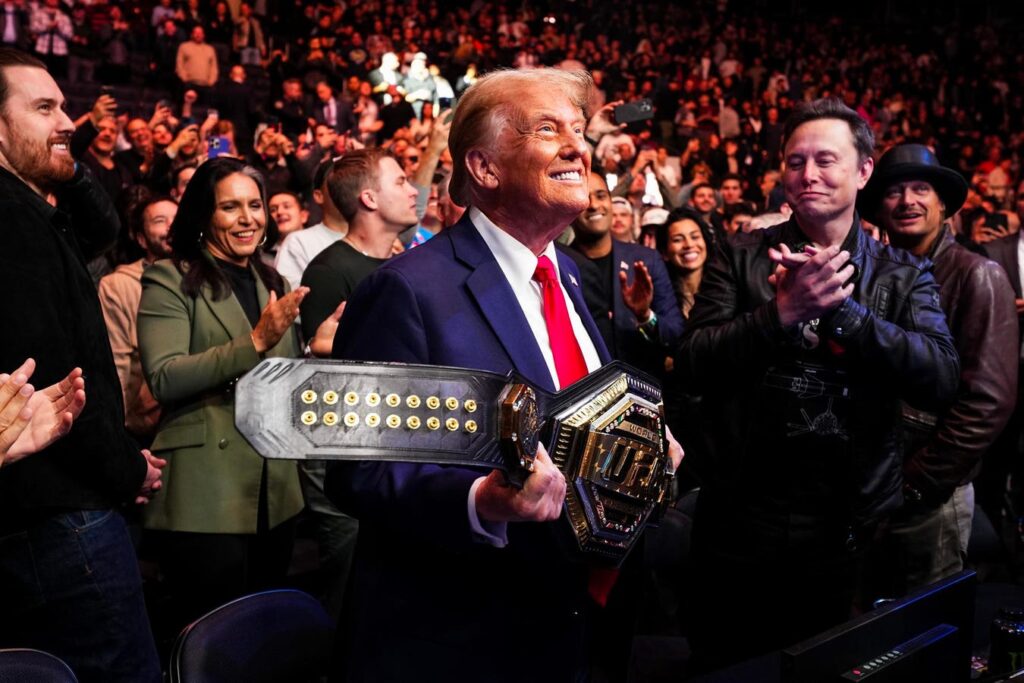NEW YORK, NEW YORK – NOVEMBER 16: President-elect Donald Trump holds the UFC heavyweight … [+]
During Donald Trump’s second term as President of the United States, the 78-year-old will serve as commander in chief as two of the world’s biggest sporting events, the 2026 FIFA World Cup and 2028 Summer Olympics, occur on American soil.
Sports consultants, experts and lawyers interviewed for this story addressed what Trump’s return to the White House means for the sports business and the areas that could be impacted more than others.
“There is a sense that the new administration is going to be more business friendly than the outgoing administration,” said Irwin Kishner, partner and co-chair of the sports group at the New York-based law firm Herrick. “You’ll certainly hear M&A and law firms saying, ‘We’ve got to be geared up for more transactions, more M&A, more joint ventures and a more favorable business environment. I believe that translates over to the sports world as well.”
Kishner, along with other experts interviewed for this story, said they could foresee more consolidation efforts in media over the next four years, which could also have an effect on the sports business industry.
Dallas Dolen, Technology, Media and Telecommunications Industry Leader for PwC U.S., said there’s also “broader macro economic optimism” with the incoming Trump regime, which will likely lead to further capital investments into the sports industry, including new and emerging leagues as well as women’s sports.
“The ROI on sports is significantly more reliable — that’s where the private equity firms come in — but it’s much more reliable as a source of return than the next AI company,” Dolen said. “I say that half kiddingly but there’s more skepticism coming into play around which AI model builder is going to be the one you put funding into. Other areas of potential investment don’t show you that ROI. Sports has continued to show it.”
Marc Ganis, co-founder and managing director of consulting firm Sportscorp Ltd., said he believes the topic of transgender rights will be “significantly altered” under Trump, a noted sports enthusiast and golfer who owns more than a dozen courses around the world.
On Sunday, during a Washington presidential rally ahead of yesterday’s inauguration, Trump said he plans to “keep men out of women’s sports,” a divisive topic across youth sports and college athletics that has generated widespread attention in recent months.
To date, there isn’t a federal law governing transgender athletes. Last week, NCAA President Charlie Baker said the NCAA “would welcome some clarity somewhere on this so everyone has a general understanding about what the rules of the game are.”
Additionally, there still remains some questions about revenue-sharing in college sports under the proposed terms of the House settlement, an historic agreement that would alter how athletes are compensated in the future.
Meanwhile, Ganis and others noted that sports fans and industry observers should keep an eye on golf, too. Scott O’Neil, newly-named CEO of LIV Golf, told Sportico that the U.S. Department of Justice is currently reviewing the golf enterprise’s proposed joint venture with the PGA Tour. In addition, O’Neil, who most recently served as CEO of Merlin Entertainments, said he believes Trump’s second term in office could be a positive for LIV, which has economic backing from Saudi Arabia’s Public Investment Fund.
“This predates me, but I’ve heard the stories it was very difficult for us to secure courses for our events in the early days,” he said. “President-elect Trump was the one that said, ‘Come play on my courses.’ ”
Some executives said other areas of interest to follow include if the respective sports champions from the major U.S. professional sports leagues and NCAA visit the White House to be honored or if Trump plans to throw out a ceremonial first pitch at a future MLB game.
In Aug. 2020, he planned to throw out the first pitch at a New York Yankees game after being asked by the team’s president but later postponed the event.
During Trump’s first term, several professional and college teams visited the White House, including the Alabama and Clemson football teams, Pittsburgh Penguins and Boston Red Sox, while others such as the Seattle Storm and Golden State Warriors weren’t invited altogether. In June 2018, Trump disinvited the Philadelphia Eagles following a dispute over some players allegedly remaining in the locker room or kneeling during the singing of the national anthem.
“Frankly, unless it’s the U.S. national teams or people representing the country, visiting the White House is a bilateral photo opportunity for the media,” Ganis said. “That really took hold during the Ronald Reagan administration because he was such a big sports fan. I’m not so sure the sports world isn’t better off not having this become a political issue.”
When asked for comment about what his second presidency means for the sports industry, Taylor Rogers, a spokeswoman for the Trump-Vance Transition, provided the following emailed statement: “As President Trump has said, sports are a microcosm of life — he appreciates the dedication, training, and perseverance an athlete endures while working with a team to win big. America loves and values sports, just like President Trump, and that is why his appearances at sporting events produces unmatched hype and resonates with everyday Americans. Also, President Trump is a champion-level golfer.”
Read the full article here
